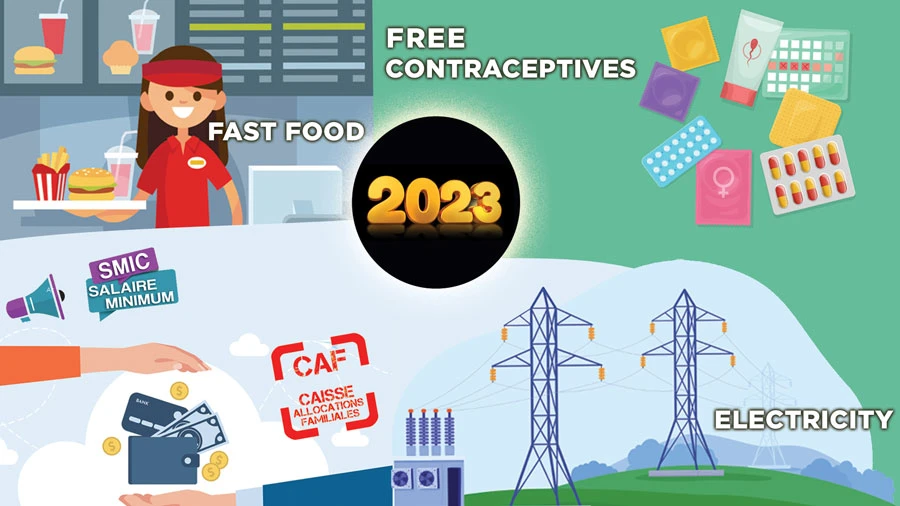
by Multidimension Paris | Jan 5, 2023 | France Today
Multidimension desk:
SMIC (Minimum Wages) has increased by 1.81%. Since last year, a gross total of 106€ has been raised due to several salary revaluations. At present, the amount will be 1,353€ net (1709,28€ gross).
Condoms are free in pharmacies for all those under 26 years.
Emergency contraception is free for all women without prescription.
The increase in regulated gas and electricity tariffs will be limited to 15%.
* For households, collective housing (co-ownerships, social housing, etc.), small size municipalities
For single parents, all child support allowance will be paid automatically.
In fast food restaurants, food consumed on the spot must be served in reusable containers.
Public transportation:
Due to the rise in energy prices and inflation, the prices of public transport tickets in Île-de-France have increased in 2023. Since January 1, 2023, the price of the Navigo pass (zone 1-5) has increased by 12% from €75,20 to €84.10 per month, an increase of nearly €10. The zone division is available in the interest of the commuters with varied pricing options.
New fares are the followings:
Monthly Navigo:
Zone 2-3 : 76,70 €
Zone 3-4 : 74,70 €
Zone 4-5 : 72,90 €
Zone 1-5 : 84,10 €
Weekly Navigo:
Zone 2-3 : 27,45 €
Zone 3-4 : 26,60 €
Zone 4-5 : 26,10 €
Zone 1-5 : 30,00 €
Solidarité transport (Monthly):
Zone 2-3 : 19,20 €
Zone 3-4 : 18,70 €
Zone 4-5 : 18,20 €
Zone 1-5 : 21,00 €
Annual Navigo:
Zone 2-3 : 843,70 €
Zone 3-4 : 821,70 €
Zone 4-5 : 801,90 €
Zone 1-5 : 925,10 €
Imagine R: price unchanged until the next school year, then €365 from September 2023 onwards
For t+ tickets:
Single ticket: €2.10
Ticket with Navigo Liberté+: €1.69
Pack of 10 tickets: €19.10
Access ticket on board (bus): €2.50

by Multidimension Paris | Dec 3, 2022 | France Today
Multidimension desk:
Upon entering the workforce at the age of 16 (or 15 in the case of an apprenticeship contract), the personal training account (Compte personnel de formation -CPF) opens for each individual which remains open until retirement.
The CPF can be used throughout your working life (including periods of unemployment) to undertake training for qualifications or certification.
You can create your CPF account on the website Mon Compte Formation to check the amount of money credited in your account as well as register for any professional training or degree.
The amount accumulated for working throughout the year will automatically be credited within the first three months of the following year. For example, rights acquired in 2022 will reflect in the first quarter of 2023.
If you work full time, or at least part time, your account is topped up from 500€ to a maximum of 5000€.
Remember that from 2 October 2022 you must have a France Connect + Identité Numérique via La Poste to register in Mon Compte Formation, even if you already have a France Connect account.
What kind of training courses you can get from your CPF account:
- Qualifications (diploma, professional identity, professional certificate etc.)
- Acquire basic knowledge and skills
- Enlisting someone’s help for validation of acquired experience (VAE)
- Proficiency test
- New business opening or takeover (training must be related to acquisition of skills related to business management)
- Acquiring necessary skills to volunteer in civic services or practise voluntary missions
- Funding for Driving Licence-B (for written test preparation on Highway Code and Driving License Practical Test) or Heavy Goods Vehicle Licence (C) or Public Transport Licence (D)
Conditions for availability of CPF for Driving Licence :
In this case 3 conditions must be fulfilled:
- Getting a driving licence must be related to your professional project or it will help secure your professional career.
- Must not have suspension imposed on your driving licence or ban from applying for a licence (you must give a written statement to this effect)
- Driving licence -B preparation must be done from an authorised training institute
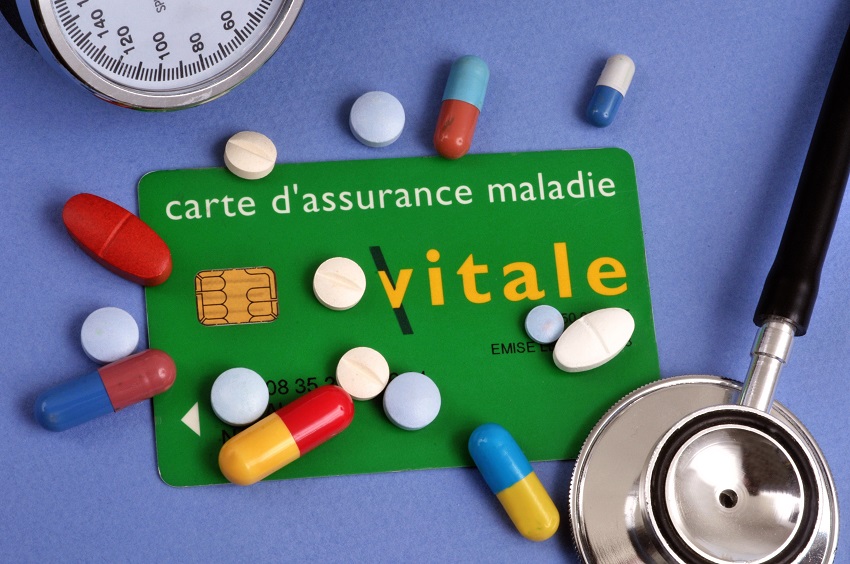
by Multidimension Paris | Nov 18, 2022 | France Today
Multidimension desk:
WHAT IS SUPPLEMENTARY HEALTH INSURANCE (CSS)?
Complémentaire santé solidaire (CSS) is a public health policy run by the Social Security office (CPAM) to provide supplementary health insurance to low-income individuals and families in addition to universal health coverage that covers all medical and health expenses including dental prostheses, glasses and hearing devices. It is actually a combination of two separate policies of the past, CMU-C and ACS, to reduce bureaucratic complexity in social life.
The applicant must meet the income limit criteria to benefit from this policy. It is divided in two parts: CSS without financial participation of the beneficiary, i.e., he does not have to make any payment for it, (Ceiling -A) and CSS with financial participation of the beneficiary, i.e., he has to pay a certain amount to get the benefit of this additional insurance, (Ceiling -B).
The eligibility is calculated on the basis of annual income or income over the past 12 months from the date of submission of the application.
Exception: The beneficiary of RSA (minimum income support) are granted supplementary health insurance (CSS) with no financial participation, during the entire period of support.
From April 1, 2022, supplementary health insurance is also granted to people who receive the solidarity allowance for the elderly persons (ASPA).
Annual income ceilings corresponding to the number of family members eligible for CSS (as of 01/07/2022):
(The ceilings indicated in these tables are effective until March 31, 2023)
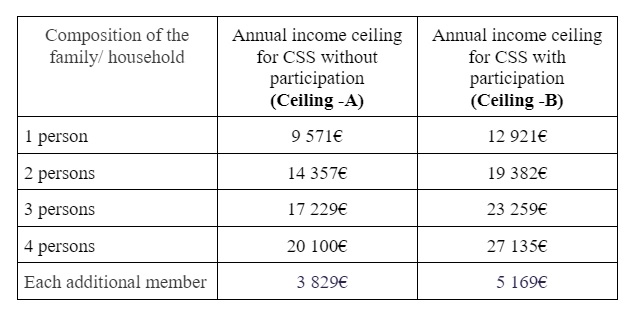
Those who are in need can apply for the CSS by submitting the application form, Cerfa n°12504*09, with all required documents to the Social Security office (CPAM).
The CPAM offers an online simulator to find out if you are entitled to complementary health insurance. In the event of a positive response, for any request, it is necessary to choose a managing organisation (Social Security office, mutual insurance company, provident institution, etc.).
It can also be applied through an ‘Ameli’ account providing allocation number of the CAF (Family allowance fund). In such a case, the Social Security office will automatically find the last 12 months’ income of an applicant.
WHAT IS STATE MEDICAL ASSISTANCE (AME)?
L’aide médicale de l’Etat (AME) is a system that allows foreigners in an irregular situation to have access to public healthcare at free of cost. It is granted under residence and income conditions. To get it, one must fill out an application form (Cerfa N°11573*09). Once granted, the beneficiary will benefit State Medical assistance for a period of 1 year.
Conditions to be fulfilled to have access to the state medical assistance:
– must have been residing in France for more than 3 months.
– must not have had a residence permit for more than 3 months.
– annual income must not exceed a certain limit
These ceilings are different in Metropolitan France (mainland) and in the DROM (The French Overseas Departments or Regions), i.e. Guadeloupe – Guyana – Martinique – Mayotte – Reunion
Income of the last 12 months from the date of submission of application is taken into consideration.
ANNUAL INCOME CEILING
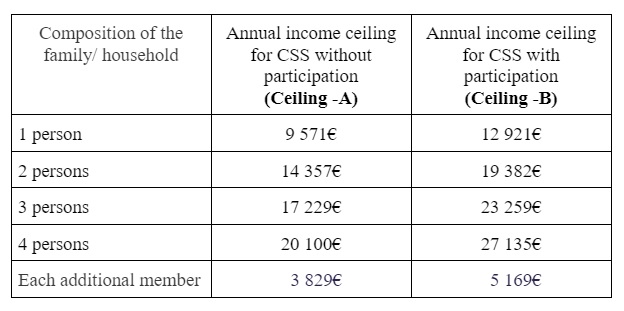
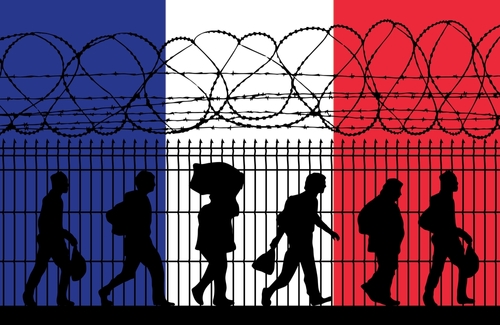
by Multidimension Paris | Nov 8, 2022 | France Today
Multidimension desk:
On 2 November 2022, the Home Minister Gérald Darmanin and the Labour Minister Olivier Dussopt outlined some important points of the future bill that will be examined by the Parliament from the beginning of 2023.
Gerald Darmanin described the new immigration bill as “mean to the bad guys, nice to the good guys”.
The stir created by the murder of the 12 year old girl Lola by an Algerian national against whom an order of “Obligation to leave French territory” (OQTF)* was issued earlier but not carried out, has further inflamed the debate on immigration. On 26 October, President Emmanuel Macron spoke on France 2 stating that “we have had too many arrivals in recent years”. Although he cautioned citizens from making generalisations and that he would “never make an existential link between immigration and security”, he nevertheless added that there is a high concentration of illegal immigration in Paris and that half of all crimes are committed by foreigners.
What should be retained from the law on immigration is to study each case individually in order to “better expel” and to monitor the OQTFs in a much harder and firmer manner. Thus, those who have an obligation to leave French territory in the future will be registered in the “File of wanted persons” (FPR)* and will be “monitored” by the prefectures. There will also be a simplification of procedures – four categories of appeal from twelve. The government’s target is to enforce OQTFs up to 50% by the end of 2023 and 100% by the end of Emmanuel Macron’s five-year term.
However, it will be difficult to enforce as consular passes must be obtained. It may seem according to the interior minister that life will be simpler for foreigners who do not disturb the peace and that multi-year residence permits will be automatically renewed. However, these multi-annual residence permits will only be given on the condition of mastering the French language and passing a French exam.
In this way, the state is trying to further regulate family reunification which is another form of immigration.
The Labour Minister Olivier Dussopt also stated that in future the administrative work permit will have to be requested by the employee in an irregular situation and not by the employer as is currently the case. Moreover, this new law on immigration aims to facilitate the professional integration of immigrant workers. Indeed, the unemployment rate is highest among foreigners. According to Olivier Dussopt, work should be the means of integration and emancipation. For example, he wants to put an end to the (long) waiting periods preventing asylum seekers from working during the first six months in France.
In addition, the Labour Minister also wants to introduce residence permits for “high pressure jobs” in sectors that have difficulty recruiting. There is a real imbalance between supply and demand for certain jobs. In 2022, many sectors were affected by a shortage of applicants.
In a survey published by the Employment Office (Pôle Emploi) entitled “Besoin de main d’oeuvre 2022” in April 2022, 10 occupations were selected as being the most difficult to recruit for, such as pharmacists, home helpers, plumbers, heating engineers and public transport drivers on the road. Of the 5,000 planned recruitments, 58% are considered difficult by the companies. Each year Pôle Emploi sends a questionnaire to companies to find out their recruitment needs by sector. This is essential to know the labour market.
This proposal has provoked other debates, according to Marine Le Pen it is “a wave of regularisation of illegals “. As for the Republican parliamentarians Eric Ciotti and Aurélien Pradié, it would be “a wave of massive regularisation. The president of the group in the Senate, Bruno Retailleau, writes “a call to the migratory air!”
The Home Minister, therefore, explained that there would be no mass regularisation since it would be “case by case” and “a chosen regularisation” for a few thousand people and that the LR could even propose a quota later on.
* Obligation de quitter le territoire français (OQTF)
* Fichier des personnes recherchées (FPR)
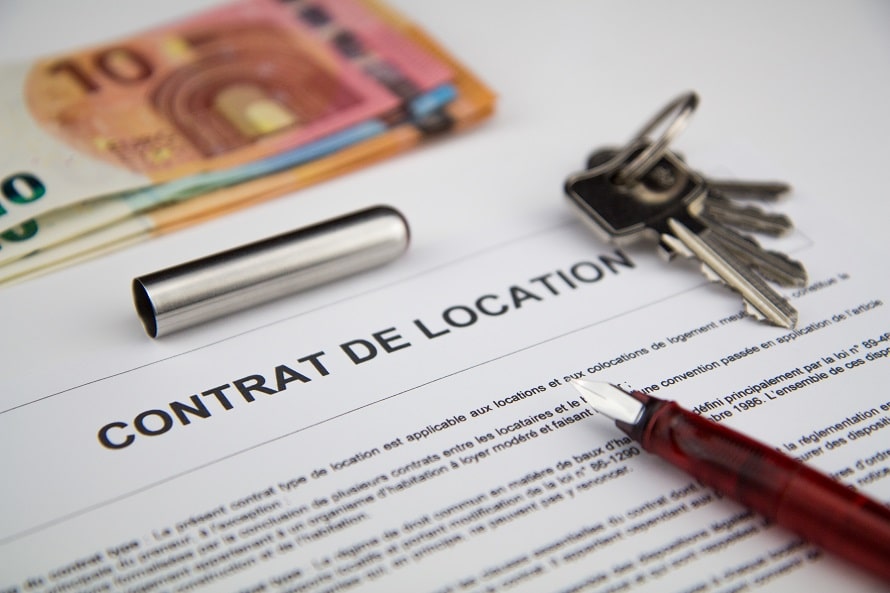
by Multidimension Paris | Nov 5, 2022 | France Today
Multidimension desk: Jecky Barua
To be eligible for public housing (HLM), the applicant must meet the maximum annual income criteria. The maximum allowed income depends on the type of housing, its location and the number of family members concerned of the housing facility.
For 1 person, the maximum annual income must be below 27481 euros and for a family of 2, the total income must not exceed 36700 euros. For a young couple, it is 44134 euros. For a family of 3 members it must remain below 44134 euros (if there is only 1 earning member and 2 dependents, the ceiling could be 53281 euros).
To apply for social housing, the income of the year n-2 (current year-2) is taken into account. For example, if an applicant applies for social housing in 2022, the reference of income (référence de revenu) of 2020 will be taken into consideration that appears in the income tax return certificate of 2021.
After the registration of your application, the waiting time will depend on which areas you have chosen as ‘your preference’. It may take a couple of years. The applicant must renew his/her application every year within the time limit until he/she receives a proposition and his/her candidacy is accepted by the commission of the social landlord. If the renewal is not done in the time limit, the application could be closed. People rarely get propositions of social housing before passing through the mediation commission DALO (Droit au logement opposable).
When to refer your demand to the mediation commission (DALO)?
If you do not receive any proposal for social housing adapted to your situation after a long waiting period, you can refer the matter to the mediation commission (DALO). In general case, the waiting period for receiving a proposition is mentioned in the housing application certificate (attestation de demande de logement social). After that period, the applicant can refer his matter to the commission. Generally it could be more than 3 years, but it varies between different districts (département).
If you are homeless, or threatened with eviction, or if you are living in housing unfit for habitation, you can refer the matter to the commission without any time limit.
If the Commission does not give you its decision within the specified period (because nowadays it does not issue rejection letters in a large number of cases), you can refer the matter to the Administrative Court (Tribunal Administratif) within two months from the day following the date mentioned in the registration letter of your application. And if you get a rejection letter from the commission, you can also refer the matter to the Administrative Court in the same manner.
On the other hand, if the decision of the commission is in your favour, if you are not given housing within the period of 6 months, then you can apply to the Administrative Court within two months from the day after the end of the period.
What is ‘Action logement’ and who are eligibles for the scheme?
Action logement is a housing scheme which was earlier known as 1% patronal or 1% Logement, i.e. employer’s 1% or 1% accommodation.
It is financed by the PEEC (participation of employers in the construction effort), paid each year by companies in the private sector and the agricultural sector with more than 50 employees. What does 1% accommodation mean? Until 1992, the rate of participation was set at 1% of the total payroll of the previous year. Today the PEEC represents 0.45% of the payroll.
The two main objectives of Action Logement are to help employees in their residential and professional mobility and to build and finance social housing.
Action Logement’s assistance reaches a wide spectrum of the population:
Employees of private sector companies with at least 10 employees
Employees of companies in the agricultural sector with at least 50 employees
Retired people, formerly employed in the private sector
Young people under the age of 30
First-time buyers
Jobseekers returning to work
Students with state grants
Disabled people
Landlords
Leasers
Tenants
Action logement can extend support whether you are a tenant, looking for a home, a homeowner, want to make renovations of your house, have to move far away due to you job or have financial difficulties.








Recent Comments